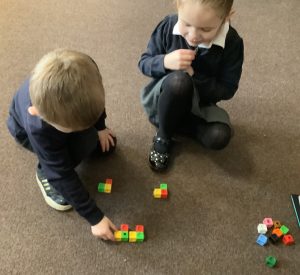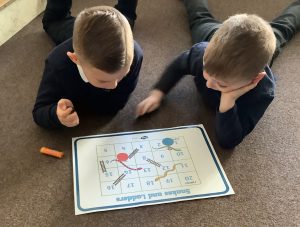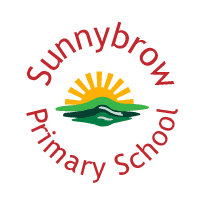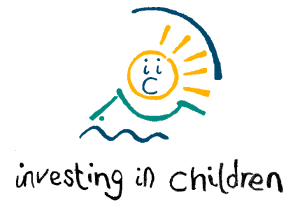Our Vision and Intent
Mathematics is an important creative discipline that helps us to understand and change the world. We want all
pupils at Sunnybrow to experience the beauty, power and enjoyment of mathematics and
develop a sense of curiosity about the subject with a clear understanding.
At Sunnybrow Primary School, we strive to empower every child to exceed by providing them with a deep understanding of mathematical concepts. We intend that every child will believe they can do maths and aim to achieve this by removing the ‘ceiling’ placed on perceived ability. Maths is about confidence levels, and providing all children (regardless of their perceived ability) with the opportunity to progress, achieve and challenge themselves in every lesson.
Our curriculum is underpinned by a ‘Mathematics Mastery’ approach to teaching. Instead of learning mathematical procedures by rote, our pupil’s will build a deep conceptual understanding of concepts which will enable them to apply their learning in different situations. Learning is mapped out in blocks to ensure what is learnt is remembered and built upon. The curriculum is cumulative – lessons are carefully planned in small progressive steps enabling pupils to learn deeply.
The aims of our Mathematics teaching and learning in school are:
- That all pupils become fluent in the fundamentals of mathematics so that they develop conceptual understanding and the ability to recall and apply knowledge rapidly and accurately.
- To provide opportunities for all pupils be able to solve problems by applying their mathematics to a variety of problems with increasing sophistication, including in unfamiliar contexts and to model real-life scenarios
- To support pupils to reason mathematically by following a line of enquiry and develop and present a justification, argument or proof using mathematical vocabulary.
- To ensure all pupils have an appreciation of number and number operations, which enables mental calculations and written procedures to be performed efficiently, fluently and accurately to be successful in mathematics.
- To ensure all pupils acquire the skills required to become independent mathematical thinkers with the knowledge and confidence to tackle problem solving and investigational tasks
We have written a set of ‘end-of-year’ expectations, which outlines our intentions for what a child should know and be able to do by the end of each academic year. Click here to read our End of Year Expectations Maths.
 At Sunnybrow Primary School, we follow the ‘White Rose Maths Programme’ to ensure context and mastery is embedded throughout the curriculum, exposing the children to a variety of problems while also building on prior knowledge and ensuring progression throughout. We also use resources from Third Space Learning to assist with the rapid recall of arithmetic facts. Our long-term planning follows a similar structure across the school from Years 1-6. Place value, the four main operations and fractions, decimals and percentages (year group dependent) are taught in detail throughout the Autumn term. This is largely influenced by the White Rose programme. Once teachers feel their children have a solid understanding of these fundamentals’, classes move on to cover the remaining areas of the Numeracy curriculum which are relevant to their year groups. Number work and written methods linked to the four operations are taught first and in greater detail than the other areas. Being able to recognise when to add, subtract, multiply and divide (and to be able to do it independently and competently) feeds through every other area in maths and should underpin all our children’s knowledge.
At Sunnybrow Primary School, we follow the ‘White Rose Maths Programme’ to ensure context and mastery is embedded throughout the curriculum, exposing the children to a variety of problems while also building on prior knowledge and ensuring progression throughout. We also use resources from Third Space Learning to assist with the rapid recall of arithmetic facts. Our long-term planning follows a similar structure across the school from Years 1-6. Place value, the four main operations and fractions, decimals and percentages (year group dependent) are taught in detail throughout the Autumn term. This is largely influenced by the White Rose programme. Once teachers feel their children have a solid understanding of these fundamentals’, classes move on to cover the remaining areas of the Numeracy curriculum which are relevant to their year groups. Number work and written methods linked to the four operations are taught first and in greater detail than the other areas. Being able to recognise when to add, subtract, multiply and divide (and to be able to do it independently and competently) feeds through every other area in maths and should underpin all our children’s knowledge.
We have broken down the larger mathematical concepts into small steps of progression to aide planning and assessment. Our long term plan then informs our medium term planning for each class. Our medium term plans are broken down into weekly and daily objectives over the course of each half-term. All of which are set out below:
Mathematics Planning Documents:
Mathematics Whole School Progression
Mathematics Small Steps of Knowledge
Class 2 Maths Medium Term Plan
Class 3 Maths Medium Term Plan
Class 4 Maths Medium Term Plan
Whole School Mathematics Long Term Plan
We teach a dedicated Mathematics lesson four days a week. On a Friday, we teach an arithmetic lesson, which focuses on specific arithmetic skills and rapid recall of known maths facts. It allows pupils to practise recently and previously learnt number skills, with time made for mathematical discussion so children are supported to see links in their learning. Number facts and times table recall is mapped across the school to provide the opportunity for practice, so that by the end of KS1 number bond recall is automatic and by the end of Year 4 all pupils can recall their times tables.
Areas of Numeracy are taught in either one week or two-week blocks, this is flexible and dependant on how much content there is to cover and how quickly the children show progress and understand what is being taught. The first lesson of every new topic is a revision lesson to activate prior learning; assessing the current understanding of children and what they have covered in previous years. Further lessons for the week are then carefully planned to suit the needs of the class.
Lessons are taught in the order of, consolidation, concrete, pictorial, abstract, problem solving, with concrete equipment being used throughout where needed. This allows natural progression of learning and skills throughout the week, with the abstract and problem solving only being taught when children have a secure understanding of what the abstract means. There should be no method taught without the children understanding why they are being taught it. As we move on to fluency, reasoning and problem solving, it is important that at ANY time our pupils can come back to pictorial and concrete resources to support them. We are promoting independent, confident learners.
We have produced a detailed calculation policy, which breaks the four main operations into small progressive steps across each group and by concrete, pictorial and abstract methods. Click here to view our calculations policy
Essential to developing a deep mathematical understanding, is the explicit teaching of mathematical vocabulary, which is modelled by adults and then used by pupils to verbalise their understanding. We are very clear about the vocabulary we expect our children to hear, know and use and have mapped it out across each year group. Our Maths Vocabulary Progression Document can be viewed here.
Lessons across all classes are physical, encourage independent learning and keep children actively learning. We teach lessons in ‘episodes’ to ensure that there is a high level of teacher modelling and to make sure those key concepts and facts stick in the children’s’ long term memory. It also helps us with ongoing assessment throughout the course of a lesson so our teaching can be adaptive where necessary. High quality teacher modelling and the correct use of mathematical vocabulary is evident, which demonstrates that teachers have a secure grasp of the concepts being taught. Teachers have a secure understanding of common misconceptions and errors, which are predicted and planned into teaching or addressed as they arise during a lesson. Child led modelling is encouraged for those more able children to show greater depth and provide extra challenge.
Challenge within lessons is no longer just a challenge question at the end of a lesson; challenge is present throughout a lesson either through questioning or the activities which are being set. Children are allowed to pick their starting point (especially in Class 4 and with support in Classes 2 and 3), based on their perceived level of confidence rather than keeping a child stuck within a specific ability group. Once children are confident, teacher feedback will see them work through the different levels of confidence in a lesson rather than answering 8 questions on the same subject and getting them all right. Similarly, children who are identified as struggling are allowed to move down because they are not quite as confident as they thought. The idea and vocabulary of higher, middle and lower groups is being replaced by talking about a child’s confidence. The perception of confidence can change whereas children see ability as being stuck at one level all the time This is being done to change the perception of maths among some children and to increase challenge and self-confidence. All children are different based on each topic within maths and everyone should have the opportunity to reach the highest level of confidence/challenge no matter what their starting point.
Assessment is largely formative and an ongoing process over the course of lessons, days, weeks and terms. Assessment grids are used by all teachers as a working document to monitor the progress of children across each area of Numeracy and the progression that is expected at the end of each class. This allows any children who are struggling to be picked up on and targeted for intervention to ensure knowledge is consolidated and they are not left with gaps in their knowledge as they move up through each year group. We hold ‘assessment weeks’ at the end of every half-term, and further mini-assessments at the end of each topic. Teachers use a mixture of formative and summative assessments within this week to allow them to establish a clear picture of a child’s current attainment.
Impact
The impact of our Maths curriculum and teaching is measured in a variety of different ways including monitoring (book scrutiny’s, learning walks, lesson observations and pupil voice) and evaluation (data recording, assessment monitoring and data analysis).
By looking in children’s books you will see a clear progression of skills throughout the week/two-week block of work, with 4 pieces of work being completed weekly. This be evidenced through a range of different pictorial, concrete, abstract and problem-solving based activities. Where the task is based on using concrete equipment, photos will be taken to evidence the work children have completed followed by a short commentary of what was achieved. Most children will be making at least good progress throughout the year and the progression of skills class by class will be clear.
You will see that teachers have a clear understanding of their individual children’s ability through adaptive teaching within a lesson. Tasks are set to suit the needs of the children with different levels of support/scaffolding given to ensure that all work that is set is at a level which challenges, especially for the greater depth and more able. This means all of our lessons are inclusive to children of all ability ranges and allows all children to succeed in Maths.
Teacher assessment results across the school are consistently good with a high percentage of children reaching their age-related expectations at the end of each year. Arithmetic and number-based results are good across the school. There will be a greater percentage of children achieving greater depth in Maths across the school through an increased exposure to reasoning and problem-solving style questions and learning effective methods to solve them.
Pupil voice feedback shows that children enjoy Maths lessons because of their practical and interactive nature. This is shown by the pride they take in their work as well as their engagement and contribution in lessons.








